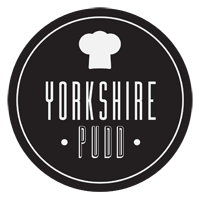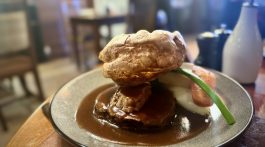Michelin-starred Yorkshire chef Jeff Baker gives us his top 12 Christmas dinner ideas
Are you hosting Christmas dinner this year and don’t have a clue where to start? Does your turkey and trimmings end in disaster most years? Fear not. Yorkshire Michelin-starred chef Jeff Baker is here to save your day.
The talented cook was awarded Leeds’ first Michelin star at the age of 26 for Pool Court restaurant, becoming Yorkshire’s youngest chef to receive the award. Today he is executive chef for North Yorkshire’s premium grocer and butcher Farmison & Co and here he shares his 12 top tips for making Christmas dinner, ensuring your celebrations are extra special this year.
1. Drink to success
It’s easy to overlook the drinks so stock up on juices and chill the fizz a few days before and open red a couple of hours before dinner to let it breathe. I like to make a mulled port by slicing 1 orange and lemon in half and studding each half with cloves and then baking in a hot oven for 20 minutes. In the meantime, boil 300ml water with some cinnamon, root ginger, spices and 10g sugar. Reduce by 50 percent, and cool a little. Add 1 bottle Port, 1 glass fresh orange juice and the baked fruits and serve warm.
2. Starter star
Need a simple yet elegant way to start your Christmas lunch? Try a watercress vichyssoise, made by finely chopping two large onions and six cloves garlic and softening in 50g unsalted butter with a little sea salt and ground white pepper. When translucent, add 300g peeled, diced potatoes and cover with 500ml vegetable stock. Cook until tender, and add 100ml single cream, simmer for five minutes, then blend with two big handfuls of watercress (with large stalks removed) until smooth. Whisk in 50g butter and season to taste. If you’re pushed for time, you can make the soup in advance and reheat, blending the watercress at the last minute.
3. Turkey troubleshooter
Worrying about how to make a Christmas turkey is the biggest cause for concern for most people – but there’s no need to panic! Simply remove the giblets from the cavity and reserve for the gravy (and if you need to, store below 5°c for up to five days, sealed inside a box with frozen ice packs), and let the bird come to room temperature, as this will enable it to roast more evenly. Weigh the turkey, and then soften 150g butter with the zest of a lemon, sea salt, thyme leaves, and a splash of olive oil. Gently lift the skin away from the breast meat starting at the cavity and push the softened butter between skin and flesh.
Next, cut an onion in half and place it with some rindless lemon, a carrot and some fresh sage into the cavity. Now put the turkey on a wire trivet and place in a preheated oven at 225°c for 20 minutes. Pour 500ml water onto the base of the tray and cover the turkey with tin foil. Reduce the heat to 165°c and roast 40 minutes per kilo, removing the tin foil for the last 30 minutes or so to colour the skin. To check the turkey is cooked, pierce the skin between thigh and breast and push the skewer into the flesh close to the bone. The juices should run clear.
Carefully remove, keep warm, and make gravy from the juices in the tray. Add the giblets to the roasting tray, colour the mixture with the vegetables from the cavity, and add poultry stock. Bring to boil and skim any fat that rises to surface, then pass through a fine sieve and serve.
4. Have a gander at goose
Again, with this bird, remove from the fridge two hours before roasting and place in a deep tray. Prick the skin with a fork being careful not to damage the flesh and pour over 1litre boiling water (this helps crisp up the skin). Remove the giblets and stuff the cavity with a cut apple, a halved onion, the zest of an orange and some sage. Rub the skin with salt and place the bird on a trivet in a deep roasting tray. Roast for 20 minutes in a preheated oven at 225c then baste the bird with its own fat.
Reduce the temperature to 165c and carry on roasting for 40 minutes per kilo or 45 minutes per kilo for a more well-done bird. Baste every 15 to 20 minutes and remove from the oven once cooked to rest. Reserve the clear goose fat for the roast potatoes, parsnips or Jerusalem artichokes.
5. Bread of heaven
For a rich and buttery bread sauce, I like this modern take on an old favourite: take six slices of brioche without crusts and crumb, heat 350ml whole milk with 1/2 diced onion, a bouquet garni and season with salt and pepper and a little nutmeg. Pour the infused milk onto the breadcrumbs and cook on a gentle heat until thickened slightly, then whisk in 50g cold diced butter and keep warm.
6. Green goddess
Often we don’t think to do more than steam or boil our greens but they too can also take centre stage. For carrots, turnips, parsnips or shallots, I place them together in a tin foil bag with a sprig of thyme or rosemary, a whole garlic clove, sea salt, and a teaspoon of duck fat. I then bake in the oven for a minimum of one hour until the vegetables are sweet and lightly caramelised. For green leaves, I boil in salted water until just cooked, then refresh in ice-cold water and drain before tossing in a little butter and cracked black pepper, sometimes with toasted almonds, caraway seeds or crispy smoked bacon.
7. The queen of cranberry
In my opinion turkey, goose and duck are best with a tart cranberry sauce and my favourite recipe involves boiling together 100g sugar, 50g redcurrant jelly, 200ml full-bodied red wine, and 50ml ruby port and reducing by 1/3. Add 1 cinnamon stick, zest of an orange, 2 bay leaves and 10 whole peppercorns to a muslin bag and tie up and drop into your liquid along with 1tsp pectin (optional) and whisk until the pectin dissolves. Add 250g cranberries and simmer for 10 minutes. Remove your bouquet garni and place the sauce in a sterile jar and store for up to one month.
8. Ring the changes with roasties
I often make a parsnip and potato gratin at Christmas by simply warming 250ml each of whole milk and cream with a couple of crushed garlic cloves, and salt and ground white pepper. When nicely infused, pour the mixture onto approximately 500g thinly sliced potatoes mixed with 200g thinly sliced parsnips. Layer in a gratin dish and bake for 15 minutes on 220c, then lower the heat to 175c and cook for a further 40 minutes or until the potatoes are tender. Don’t forget to press the gratin now and again to form a cake like texture.
9. Piggy in the middle
A lovely alternative to pigs in blankets is a pitted prune and a sage leaf wrapped in some Lancashire pancetta and grilled.
10. Just desserts
If you want a show stopping dessert, or just need to use up all those Christmas puddings, then mix 3tbsp dark rum with 3tbsp muscovado sugar in a small bowl and leave to stand so the sugar dissolves. Turn out three individual Christmas puddings into a bowl along with the grated zest of one lemon and one orange and mix with a fork. Divide into six equal portions, and roll each one into a sausage shape about 12cm in length.
Take seven sheets of feuilles de brick pastry and peel one of the sheets away from its backing paper and lay on a clean, dry surface. Turn the first 6cm of pastry nearest to you inwards to make a fold and take one of the rolled pudding pieces and place it centrally along the folded edge. Roll tightly away from you to make a long cigar shape and repeat the process with the other sheets, placing them evenly on a baking tray.
Take the remaining sheet of pastry and cut 12 ribbons of pastry (1cm wide) from the centre of the pastry. Pinch around both ends of each pudding and gently tie with a pastry ribbon – without pulling too tightly – so they look like crackers. When all the crackers have been tied, pop the tray on the centre shelf of the oven and bake for 18 minutes.
Make a rum cream by combining the rum-and-sugar mixture with 250g mascarpone using a hand whisk and once the crackers are cooked, let them stand for 10 minutes before cutting each one in half diagonally with a serrated knife. Serve half a cracker leaning against another, dusted with icing sugar and cream on the side.
11. Christmas leftover lovelies
A quick and delicious way to use up any leftover turkey is to dice two onions and soften with a crushed clove of garlic. Add a glass of dry white wine and boil into syrup. Add 200ml chicken stock and 200ml cream and bring to a boil, seasoning with salt and pepper. Roughly slice 150g mixed mushrooms and add to the sauce with your shredded turkey and a dozen or so chestnuts, walnuts or almonds. Simmer for 20 minutes on a low heat and add a handful of chopped parsley. Serve with rice or potatoes or make into a pie by covering with puff pastry and baking for 20 minutes at 190c until golden brown.
12. Boxing Day bake
After the indulgence of Christmas Day it’s nice to have a palate cleansing starter or salad for Boxing Day. Try baking 12 black figs in a cool oven at about 120°c with 4tsp truffle honey until tender (about 15-20 minutes). Next, mix together 4tsp walnut oil and 1tsp sherry vinegar and toss with rocket leaves. Add the figs and 200g Yellison goat’s curd and scatter with a handful of broken walnuts.
Good luck everyone!










